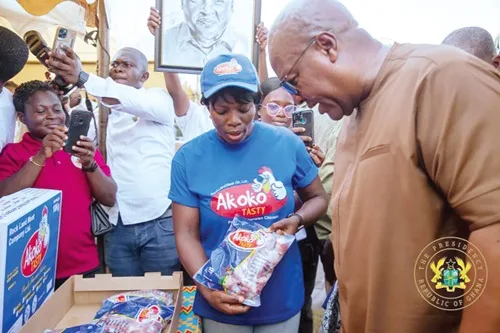President John Dramani Mahama has launched the “Feed Ghana Programme” through an official ceremony, which stands as a thorough plan to revitalize agriculture while generating employment and decreasing food imports.
During his speech at Techiman in Bono East Region on Saturday, President Mahama declared that the program serves multiple functions, from agricultural development to job establishment and food protection.
AETA stands as the broader vision that incorporates the “Feed Ghana Programme” as one of its components. The program targets enhanced production rates for critical rice, soybeans, maize, cassava, yams, tomatoes, and onions.
The initiative works to enhance the production of livestock, plus it supports industries that cultivate cocoa along with oil palm, shea nuts, and cashew.
President Mahama stressed that society requires strong, decisive actions to take effect. The national economic transformation needs agriculture to serve as its cornerstone.
Fighting Import Dependence
The nation of Ghana devotes more than $2 billion each year to imported food purchases, which include a substantial $400 million expenditure on chicken products. President Mahama declared this pattern unsustainable because it subjects the country to worldwide price fluctuations as well as currency volatility.
The government will address this problem by creating farmer service centres and establishing farm banks for financing while promoting urban agriculture and backyard poultry interests. Training services combined with agricultural resources and market protection will be provided to all farming sectors.

READ ALSO: BREAKING: MP Mahama Ayariga’s House Set on F!re in Bawku Chaos
Focus on Youth and Women
The initiative works towards recruiting additional young people along with women to participate in farming. The president established 55,000 households for poultry farming, where each household should maintain an annual production of 500 birds. The program would generate more than a million birds annually, which would create increased household earnings and enhanced food nutritional value.
National Palm Oil Policy
This policy serves as a fundamental part of this program to boost palm oil development throughout its entire lifecycle. The industry will gain support through the development of agro-processing zones equipped with irrigation systems, power supply, roads, and storage facilities for private sector investment.
A Call to Action
The national food and agriculture minister, Eric Opoku, requested Ghanaian support for the initiative because the nation derived most of its food from Burkina Faso, Niger, and other external sources. He emphasized that Ghana possesses all the necessary resources to feed its own population as well as a surplus.
The Feed Ghana Programme has excellent potential to become the driving force of Ghana’s economy through its combination of rich land resources and plentiful water along with determined political backing.








